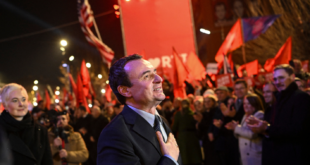Serbian President Boris Tadić said on Tuesday that he expects the negotiations on the status of Kosovo to continue after the ICJ ruling.
The Hague-based International Court of Justice (ICJ) is expected to give its advisory opinion this year on the legality of the February 2008 unilateral independence declaration, made by the province’s ethnic Albanians.
Speaking for Zvečan, northern Kosovo, based Most TV, Tadić said that Belgrade expects new talks, and remains committed to the policy of peace.
Tadić also said during the interview that will air this evening that Serbia will pursue an active foreign policy, with negotiations as a means of resolving the future status of Kosovo and Metohija.
“Regardless of the stance of the interim institutions in Kosovo, for Serbia this issue is not resolved, because Kosovo has failed to establish the standards of human rights, citizens’ interests, rule of law and freedom of movement that apply in legitimate states,” Tadić said.
“We expect negotiations after the ICJ renders an advisory opinion, and we remain committed to the policy of peace. We want to sit with ethnic Albanians at the negotiating table and find a compromise solution, which entails Serbia in Kosovo and not only the interests of ethnic Albanians,” the president said.
He reiterated that Serbia will “never, under any circumstances whatsoever”, recognize Kosovo, pointing out that the country “has no intention of managing the lives of Kosovo Albanians”.
Tadić stressed that Serbia “wants to be a part of the solution rather than the problem in Kosovo”, and that Belgrade will continue to assist the region in joining the EU, but only as an integral part of Serbia.
Stressing that Serbia “deserves respect” for the huge funds it sets aside for Kosovo and Metohija, Tadić said, however, that the question remained of “where these funds are being spent”.
“Does the money end up in the pockets of individuals and is it spent in an irrational manner, jeopardizing the survival of the Serb people and institutions in Kosovo,” the president wondered, and said that individuals that might be abusing that money deserve to be condemned and prevented, “which the state will do”.
 Eurasia Press & News
Eurasia Press & News



